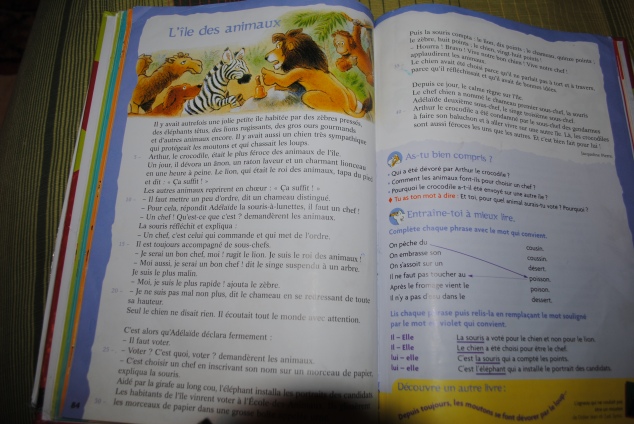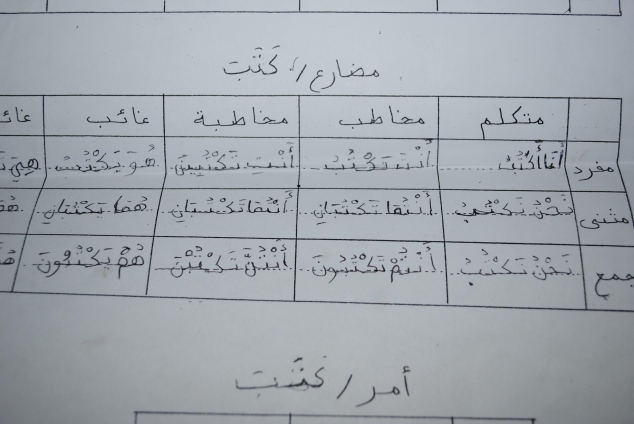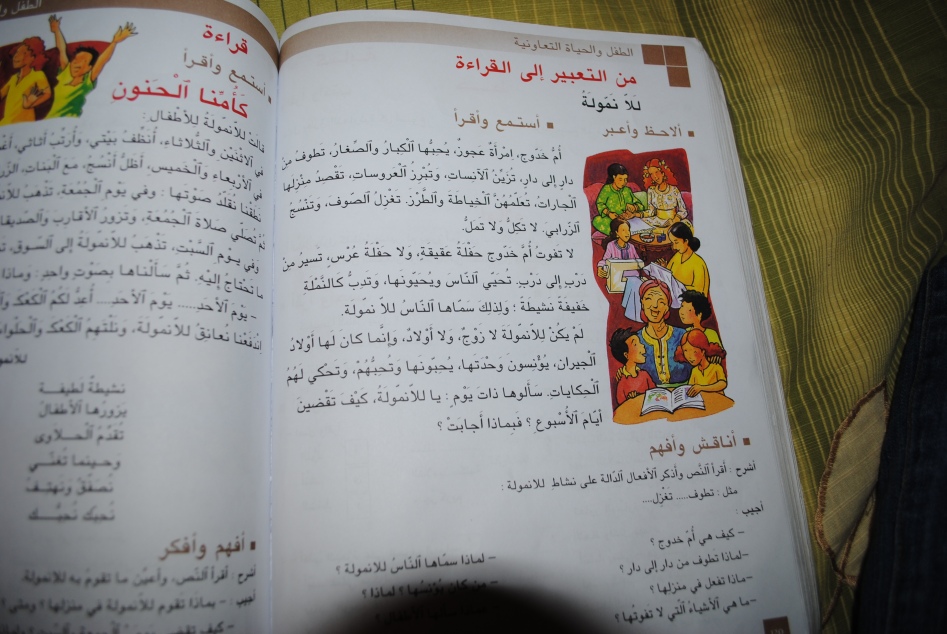Do you have what it takes to make it in a 2nd grade classroom in Morocco?
Let’s start with something nice and easy. French grammar! French is what the language teaching experts call a moderately inflected language. An inflected language is a language where the endings of the words change, depending on their position in the sentence. I don’t speak Latin, but I understand that Latin is a highly inflected language. You could tell just from looking at the word whether it’s a subject, and object, or something else.
In French conjugation the endings change for each personal pronoun. I’m trying to make it simple, I really am. Ok, so here is an example. The page on the right, below, is about conjugating the verb “avoir” (to be) in the future. The words in black are the verb. See how it’s different for the pronouns je, tu, il….? Compare that with English conjugation. I’ll have, you’ll have, she’ll have,…. they’re all the same. In this battle of easiness, English wins hands down.
Now, remember, all this is very important if you’re a 7 year old Moroccan kid, so pay real close attention. You will be studying French grammar for the next 10 years or so.
And now, a change of tempo, let’s go to French reading! Here is the text we are reading today. It’s about some talking animals who vote to elect their leader. Bizarre concepts here!
Ok kids, it’s noon, time to go home for lunch. See you at 2 o’clock!
Good afternoon, or should I say masaa el khair, since we are studying Arabic this afternoon.
Remember how this morning, we said French is an inflected language? Good. Because Arabic is a super duper inflected language. In Arabic, there are 15 personal pronouns. Yes, we have the standard I, you, she, he….we also have you two females, you group of males, you group of females…Arabic has different pronouns for masculine and feminine, and in addition to singular and plural, there is also dual (for addressing two people). And each one of these personal pronouns has a different conjugation. So let’s get right to it. Here is the verb “kataba” (to write), please conjugate it for each of the 15 different pronouns.
Ok, maybe that’s just too easy. Fine, let’s just go to reading. Today we will read about Lalla Tamoula, a good woman who teaches her neighbors how to sew, card wool, and weave rugs.
Oh, I hear the bell ring. Is it 5 o’clock already? Wow, time flies when you’re studying grammar.
Don’t forget your homework kids. I want you to memorize the first three sentences of our French text, for auto-dictation tomorrow. Also, don’t forget the math worksheet, science lessons, and poems I asked you to memorize.
See you tomorrow, and every other school day till you’re 18!





I must say learning all this would make my head spin.
Even the French looks difficult. I wish that I had spent more time studying Arabic.
Maybe I’ll have more time in the future!
Excellent post.
Warm at last here.
Greetings to your family.
Each language has its difficulties and its easy rules.
English verbs may not change a lot in conjugation but watch out for those irregular ones! And speaking of irregularities, try to find a standard pronunciation for such groups of letters as GH, TH, OU, OO etc… or just the simple vowels I A O …
and this must be one of the reasons why so many Moroccan children give up on school long before they get to the age of 18!
My second-grader son would cry a river over this! I’ll show him this post so he will stop saying I make him work too hard (we are a homeschooling family for now). I love your blog! Thanks for sharing.
To someone who once attempted French as a foreign language this brings back memories. If only there were blogs then, like yours, my life at school might’ve been easy.
Masha’allah, french is really easy for me, esp the one I can see on the picture. I guess its because I am studying french, you need to learn all the verbs and use them, you will get the hang of it really quickly. It is like English, there are rules for the Regular verbs, and the Irregular verbs are a bit complicated!
The Arabic book looks so much like the books that are used in schools here, in Algeria.
Lovely handwriting masha’allah!
Thanks for this post. Now I know why I’ve had so much trouble with Arabic all these years! I’ve learned French and have good vocabulary that I can speak conversationally, but I know I massacre the grammar–never have been able to figure out which words are masculine or feminine, so I just don’t pay any attention to it. As far as conjugating correctly, I know I make quite a mess of it in French. No wonder I can’t make heads or tails of Arabic!! I didn’t realize about the inflection business, but that really explains my problem!
Assalamu alaykum,
I love your child’s work. MashAllah. Very nice handwriting. We have mostly Arabic here in Jordan with some English, but not half a day for each language. I wish there was more of an attempt at bilingual and trilingualism. Alhamdulillah. I would be very pleased to have my children taking French, since I could actually help them! Do your kids take any English at school? When would they have time?? SubhanAllah. The Arab school system is pretty rigorous. May Allah protect those little minds.
Believe me, as a student of both French and Arabic, I understand how difficult the languages are! But they’re both beautiful. At least Arabic and French both have alphabets! What about Chinese or Korean, that use word pictures to write language? And neither French nor Arabic is a tonal language.
If your children really like the languages though, it’s best that they learn them when they’re young and have sponges for brains – they can soak up everything more easily! Your children must be very smart, mashallah!
Is this your son/daughter’s schoolwork? Their handwriting is very, very pretty. Do you know if a particular handwriting curriculum is used. I’d love to learn to write like that. 🙂
Ok, I’ve got the French part. I studied both French and Spanish at school. But Arabic, a totally different language with obviously very different characters, in the same day as French, wow! Bravo les enfants !